|
|
|
Sort Order |
|
|
|
Items / Page
|
|
|
|
|
|
|
| Srl | Item |
| 1 |
ID:
181421
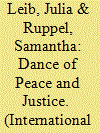

|
|
|
|
|
| Summary/Abstract |
This article investigates local perceptions of international peacebuilding in Sierra Leone and Liberia and explains the need for an inclusive framework addressing peace and justice at the same time. These neighbouring countries in West Africa not only share the burden of an intertwined conflict history but have also been described as prototypes for successful peacebuilding. However, both cases show striking differences with regard to the relative importance given to security and justice during the peace process and within the selected peacebuilding approaches. In Liberia, the peacebuilding framework was clearly sequenced, favouring security over justice. In Sierra Leone, it included a comprehensive TJ component, which was implemented alongside security-centred initiatives. In order to compare these two cases and to elaborate on the challenges of establishing both peace and justice in post-conflict settings with a more people-centred focus, we conducted expert interviews with (inter)national peacebuilding actors and opinion surveys, asking how the civilian populations themselves perceive the peace process and the effectiveness of international peacebuilding. The findings provide insights into local experiences with the inclusive peacebuilding framework implemented in Sierra Leone and the drawbacks of delaying justice and accountability in Liberia.
|
|
|
|
|
|
|
|
|
|
|
|
|
|
|
|
| 2 |
ID:
181423
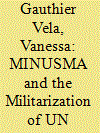

|
|
|
|
|
| Summary/Abstract |
MINUSMA, the UN peace operation in Mali, represents a new development in peace missions, due to the insecure transnational context in which it has evolved and its mandate to collaborate with counterterrorist forces in the region. The goal of this paper is to study this new development, using Enloe’s feminist theorization of the concept of militarization. I base my analysis on an understanding of militarization as a social process that can be adapted or contested. Grounded in a qualitative methodology, I study MINUSMA and its peacekeepers in order to identify how the process of militarization takes place within/through the mission. My principal argument is that the context of robust peacekeeping, combined with the implications of collaboration with counterterrorist operations and the reengagement of NATO troop contributing countries, creates a space in which militarization is reinforced for the mission and its peacekeepers and that this impacts how they interact with one another and what practices they favour.
|
|
|
|
|
|
|
|
|
|
|
|
|
|
|
|
| 3 |
ID:
181422
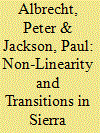

|
|
|
|
|
| Summary/Abstract |
This article explores how transitions produce non-linearity in Sierra Leone’s security and justice programming, as it unfolded from the late 1990s and onwards starting in open conflict. Transitions have received limited detailed analytical consideration in the literature on interventions because they are mundane and inevitable, and therefore taken for granted. However, they definitively condition how programmes evolve. We show that transitions can be seemingly small as well as comprehensive, but commonly have unpredictable, hidden and often unmanageable transformative effects on the trajectory of security and justice programmes. To conceptualize the logic of transitioning, ritual theory – and specifically liminality that is a central component of rites of passage – is used to capture the inherent diffuseness and unpredictability of transitioning. Transitions in programming are liminal moments, ‘neither here nor there’, and as such characterized by ambiguity and indeterminacy. The ambiguity, and importance, of transitions stems from their potency to disturb the direction of programming, requiring the suspension of routine, which internationally funded programming is notoriously ill-suited to deal with. Empirically, the article looks at three types of transitions in Sierra Leone: (1) war to peace; (2) turnover of staff; and (3) elections leading to change of the party in power.
|
|
|
|
|
|
|
|
|
|
|
|
|
|
|
|
| 4 |
ID:
181420
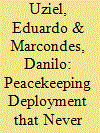

|
|
|
|
|
| Summary/Abstract |
The article aims at investigating how do mechanisms of bureaucratic politics contribute to the decision of deploying troops and in so doing to mold the national motivations underscoring the deployment. The text takes Brazil as a case and researches the decision-making process in the country, using past cases of deployments that actually happened. The bulk of the analysis, however, is dedicated to the negative case where Brazil decided not to contribute to the United Nations Multidimensional Integrated Stabilization Mission in the Central African Republic (MINUSCA). The analysis provides a breakdown of the 2017–2018 domestic political and bureaucratic decision-making process in Brazil as regards the possibility of deploying troops to MINUSCA and traces the mechanisms in action that resulted in the negative decision by the government. Based on the case of Brazil, considerations are made on the importance of investigating negative scenarios to better understanding how developing countries, such as the BRICS, value the motivations and ultimately decide to contribute to a UN mission.
|
|
|
|
|
|
|
|
|
|
|
|
|
|
|
|
| 5 |
ID:
181418
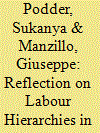

|
|
|
|
|
| Summary/Abstract |
Why do the attitudes of United Nations military peacekeepers towards peacekeeping shift after their deployment from positive to negative ones and how do labour hierarchies influence this shift? Using surveys with military peacekeepers gathered within a professional military education (PME) context, we conducted an exploratory pilot study about individual attitudes towards UN peacekeeping operations (UNPKOs) after deployment. We found that a majority changed their opinion about UNPKOs as an effective tool for peacebuilding from positive to negative. Specifically, we found that 82% of troops from the Global South changed their perceptions from positive to negative after deployment; while 59% of Global North peacekeepers did not change their perceptions. This shift was on account of enduring command and control challenges, problems with analysing intelligence, and, the growing demands of robustness to protect civilians, which increasingly place peacekeepers from the Global South at the risk of armed attacks and under scrutiny for underperformance. Findings urge scholars and policy-makers to address the problem of labour hierarchies in the political economy of peacekeeping as a significant source of misalignment between the perceptions and experiences of troops from the Global South and the growing expectations of performance from them.
|
|
|
|
|
|
|
|
|
|
|
|
|
|
|
|
| 6 |
ID:
181419
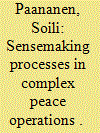

|
|
|
|
|
| Summary/Abstract |
This article examines sensemaking in complex peace operations. The article’s key argument is that adaptation to ‘the local’ and its complexity requires sensemaking, and that sensemaking helps to disrupt conflict dynamism and prevent conflicts. The study’s theoretical underpinnings are linked to the concept of sensemaking and its further development. The findings are based on eleven in-depth interviews with commanders who have concrete command experience in peace operations. The research findings describe four processes – sensegiving, sensebreaking, sensedrawing and sensekeeping – that are part of the sensemaking entity. Each process entails practices in which sense is embedded, negotiated and regenerated to be shared, in order to work with change, adapt to local necessities and sustain peace. Theoretically, the article contributes to the existing understanding of complex, ongoing and longstanding crises in general and adaptive and proactive sensemaking, in which ‘the local’ is emphasized, in particular.
|
|
|
|
|
|
|
|
|
|
|
|
|
|
|
|
|
|
|
|
|